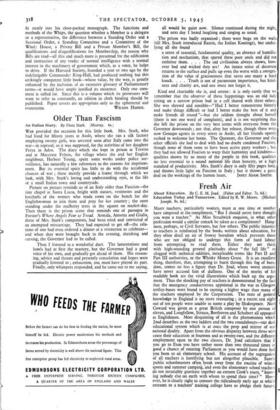Older Than Fascism
An Italian Diary. By Flora Stark. (Murray. 6s.) WAR provided the occasion for this little book. Mrs. Stark, who had lived for fifteen years at Asolo, where she ran a silk factory employing twenty girls, was arrested soon after Italy came into the war—in reprisal, so it was supposed, for the activities of her daughter Freya in Aden. The diary which she kept in prison at Treviso and at Macerata Feltria, the village where she and her English neighbour, Herbert Young, spent some weeks under police sur- veillance, has naturally a few references to the reasons for imprison- ment. But its essential spirit has little to do with the accidental chances of war ; these merely provide a frame through which we look, with Mrs. Stark's loving and understanding eyes, at the life of a small Italian town and countryside.
Picture on picture reminds us of an Italy older than Fascism—the tiny chapel at Santa Lucia, bright with statues, vestments and the kerchiefs of the women who made room on the bench for the Englishwoman to join them and pray for her country ; the oxen standing under the mulberry trees in the square on market-day. Then there is the prison scene that reminds one of passages in Forster's Where Angels Fear to Tread. Armida, Annetta and Giulia, three of Mrs. Stark's companions, had been tried and convicted of an attempted miscarriage. They had expected to get off—the rela- tions of one had even ordered a dinner at a restaurant to celebrate— and when they were brought back in the evening, shrieking and cursing, the Governor had to be called.
Then I listened to a wonderful duet. The lamentations and howls had at first the mastery, but the Governor had a good voice of his own, and gradually got ahead of them. His reason- ing, advice and threats and presently consolation and hopes were gradually listened to ; exhaustion, too, must have played its part. Finally, only whimpers responded, and he came out to me saying, all would be quiet now. Silence continued during the night, and next day I heard laughing and singing as usual.
The prison was badly organised ; there were bugs on the walls (till Mrs. Stark introduced Razzia, the Italian Keatings), but under- lying all she found a sense of essential, fundamental quality, an absence of humilia- tion and mechanism, that spared these poor souls and did not embitter them. . . . The old civilisation always shows, how- ever bad and wicked they are! An innate sense of decorum returns to the surface and pulls up even the worst with a recogni- tion of the value of graciousness that saves one many a hard knock. . . . Truth is not of paramount importance, but kind- ness and charity are, and one must not forget it.
Kind and charitable she is, and serene: it is only rarely that we remember that the observer of these happenings was an old lady sitting on a narrow prison bed in a cell shared with three others. She was shrewd and sensible—" Had I better remonstrate bitterly and make things difficult or had I better make the best of it and make friends all round "—but she seldom thought about herself (there is not one word of complaint), and it is not surprising that she left the prison on the very best terms with everyone from the Governor downwards ; nor that, after her release, though there were now Gestapo agents in every street in Asolo, all her friends openly rushed to welcome her home. The Questore, the Governor and the other officials she had to deal with had no doubt condoned Fascism, though none of them seem to have been active party workers ; but they had not allowed Fascism to warp their humanity and kindness— qualities shown by so many of the people in this book, qualities no less essential to a sound national life than honesty, or a high standard of productivity. Mrs. Stark's diary is only fifty pages long, and throws little light on Fascism in Italy ; but it throws a great
deal on the workings of the human heart. JANET ADAM SMITH.


























 Previous page
Previous page